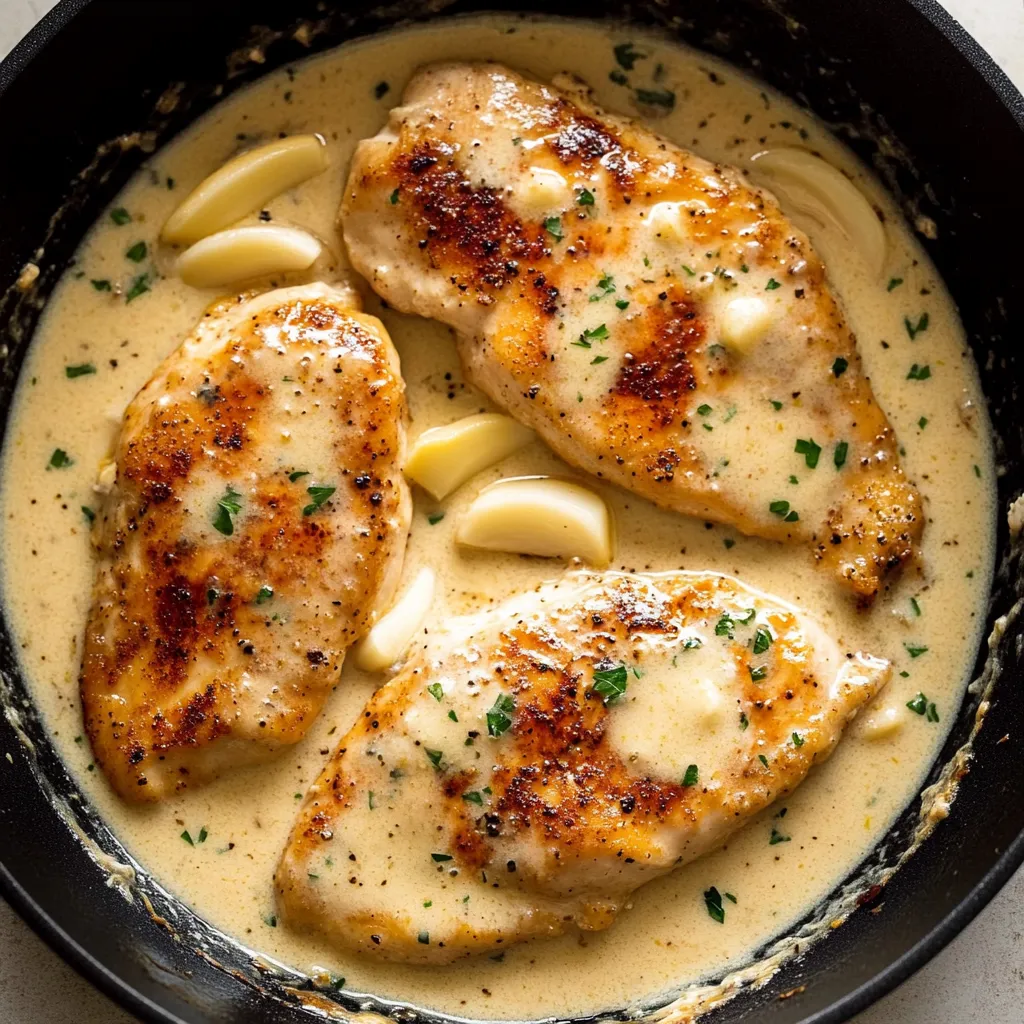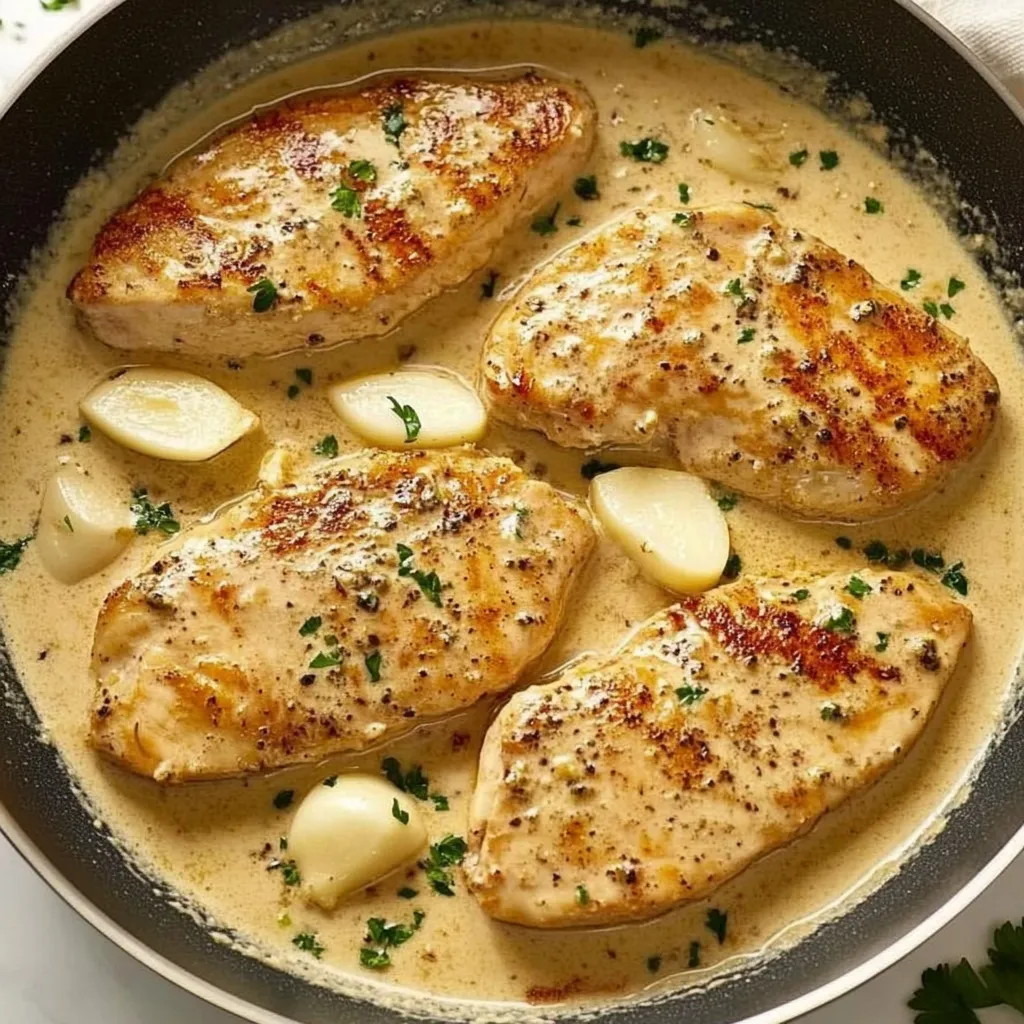 Pin it
Pin it
This creamy garlic chicken transforms simple ingredients into a restaurant-worthy meal that'll have your family scraping their plates clean. The magic lies in the balance between tender chicken cutlets and a velvety garlic sauce that's rich without being overpowering.
I first made this recipe when unexpected dinner guests arrived, and my pantry was nearly bare. The combination of chicken, garlic, and cream saved the evening and resulted in more recipe requests than any fancy meal I'd ever prepared. My brother-in-law, who typically pushes food around his plate, asked for seconds and then photographed his plate to remember what he'd eaten!
Ingredients
- Chicken breasts – Cut them lengthwise into cutlets for quicker, more even cooking. This technique ensures the chicken stays juicy while cooking fast enough to keep dinner on schedule.
- All-purpose flour – Creates a delicate coating that browns beautifully and helps thicken the sauce. The slight crust it forms on the chicken adds wonderful texture against the creamy sauce.
- Olive oil and butter – This combination gives you the best of both worlds: the higher smoke point of olive oil and the rich flavor of butter without burning.
- Whole garlic cloves – Don't be intimidated by using an entire head! They mellow dramatically during cooking, transforming into buttery, sweet morsels that are nothing like their raw counterparts.
- Chicken broth – Provides depth and savory notes that balance the richness of the cream. The better your broth, the more complex your final sauce will be.
- Lemon juice – Just a touch brightens the entire dish and cuts through the richness. Without it, the sauce would feel heavy rather than luxurious.
- Garlic powder – Adds a different dimension of garlic flavor that complements the whole cloves. The powder infuses the entire sauce while the cloves provide bursts of mellowed garlic.
- Heavy cream – Creates that silky, indulgent sauce that makes this dish memorable. Its higher fat content allows it to reduce without curdling, creating a stable emulsion.
Step-by-Step Instructions
- Prepare the chicken –
- Start by slicing each chicken breast horizontally into two even cutlets. Pat them completely dry with paper towels to ensure proper browning. Season generously with salt and pepper on both sides, allowing the seasoning to adhere to the meat before dredging in flour.
- Dredge carefully –
- Coat each piece lightly in flour, shaking off any excess. Too much flour will create a gummy coating rather than a delicate crust. Your goal is a thin, even layer that will brown beautifully and help thicken the sauce later.
- Heat the pan properly –
- Begin with a large skillet over medium-high heat, adding both olive oil and butter. Wait until the butter stops foaming before adding the chicken—this indicates the water has evaporated and you'll get better browning.
- Cook the chicken –
- Place the cutlets in the hot pan without crowding, working in batches if necessary. Let them cook undisturbed for 4-5 minutes until golden brown before flipping. The chicken should release easily from the pan when it's ready to turn.
- Remove and rest –
- Once both sides are golden (about 8-10 minutes total), remove the chicken to a plate and tent loosely with foil. It doesn't need to be fully cooked through yet as it will finish in the sauce later.
- Brown the garlic –
- In the same pan with all those flavorful bits left behind, add the whole peeled garlic cloves. Cook them gently, stirring occasionally until they're lightly golden on multiple sides. This process mellows their sharpness and brings out their natural sweetness.
- Deglaze the pan –
- Pour in the chicken broth and lemon juice, scraping the bottom of the pan with a wooden spoon to release all the browned bits. These contain concentrated flavor that will enhance your sauce tremendously.
- Reduce the liquid –
- Allow this mixture to bubble vigorously for 3-4 minutes until reduced by about half. This concentrates the flavors and ensures your final sauce won't be watery.
- Create the cream sauce –
- Lower the heat to medium-low before pouring in the heavy cream and garlic powder. Stir well to incorporate, allowing the sauce to gently simmer but not boil rapidly which could cause separation.
- Return chicken to finish cooking –
- Nestle the chicken cutlets back into the simmering sauce, including any juices that collected on the plate. Let them finish cooking gently in the sauce until they reach 165°F internally and the sauce has thickened enough to coat the back of a spoon.
- Rest before serving –
- Allow the dish to rest for 5 minutes off the heat before serving. This gives the chicken time to reabsorb some moisture and lets the sauce reach the perfect consistency.
 Pin it
Pin it
The transformation that happens as the garlic cloves cook in the sauce is truly magical. They become tender, sweet, and almost buttery – nothing like the sharp, pungent raw cloves you started with. Don't be surprised when people fish them out of the sauce as treasured bites!
My Italian grandmother taught me to respect garlic as an ingredient that transforms dramatically with different cooking methods. She would laugh at how Americans feared using "too much" garlic, explaining that proper cooking eliminates harshness. Her trick of cooking whole cloves until meltingly soft completely changed my relationship with this humble ingredient.
The Secret to Perfect Chicken Cutlets
The difference between dry, tough chicken and juicy, tender cutlets often comes down to thickness and temperature. By cutting breasts horizontally into thinner pieces, you get more even cooking without dried edges or undercooked centers. Testing with a thermometer ensures you pull the chicken from the heat at exactly 165°F – the sweet spot for food safety without sacrificing moisture.
Creating Silky Sauces Without Separation
When working with cream sauces, patience becomes your greatest ally. Gentle heat allows the fat globules in cream to emulsify properly with the other liquids, creating that silky texture we all crave. The addition of acid (lemon juice) needs to happen before the cream to prevent curdling, and reducing your broth first concentrates flavors while preventing a watery final product.
Building Flavor Through Layering
The depth in this seemingly simple dish comes from careful layering of flavors – fond (browned bits) from the chicken, gentle caramelization of garlic, reduction of liquids, and finally, the enrichment with cream. Each step builds upon the last, creating complexity that belies the short ingredient list.
After years of cooking, I've found that this comforting dish bridges the gap between everyday cooking and special occasions beautifully. There's something deeply satisfying about creating such depth of flavor with humble ingredients like garlic and cream. The way the sauce clings to each bite of chicken, and how those tender garlic cloves become treasures to discover throughout the meal – it makes dinner feel special even on the most ordinary Tuesday night. This recipe has earned its place as my reliable crowd-pleaser, equally at home alongside a simple salad or dressed up with roasted vegetables for dinner guests.
Frequently Asked Questions
- → Can I use chicken thighs instead of breasts?
- Yes! Boneless skinless chicken thighs work great in this recipe. They're even more forgiving and won't dry out as easily as breasts.
- → What can I substitute for heavy cream?
- Half and half or whole milk with a tablespoon of flour whisked in works as a lighter option. The sauce won't be as thick and rich though.
- → Can I add vegetables to this dish?
- Absolutely! Spinach, mushrooms, or peas make great additions. Add mushrooms with the garlic, and leafy greens or peas during the last few minutes of cooking.
- → What should I serve with creamy garlic chicken?
- Pasta, rice, mashed potatoes, or crusty bread work well to soak up the delicious sauce. Add a simple green salad on the side for a complete meal.
- → Can I make this ahead of time?
- Yes, it reheats well. Store in the fridge for up to 3 days and warm gently on the stove. The sauce might thicken, so add a splash of chicken broth when reheating.
